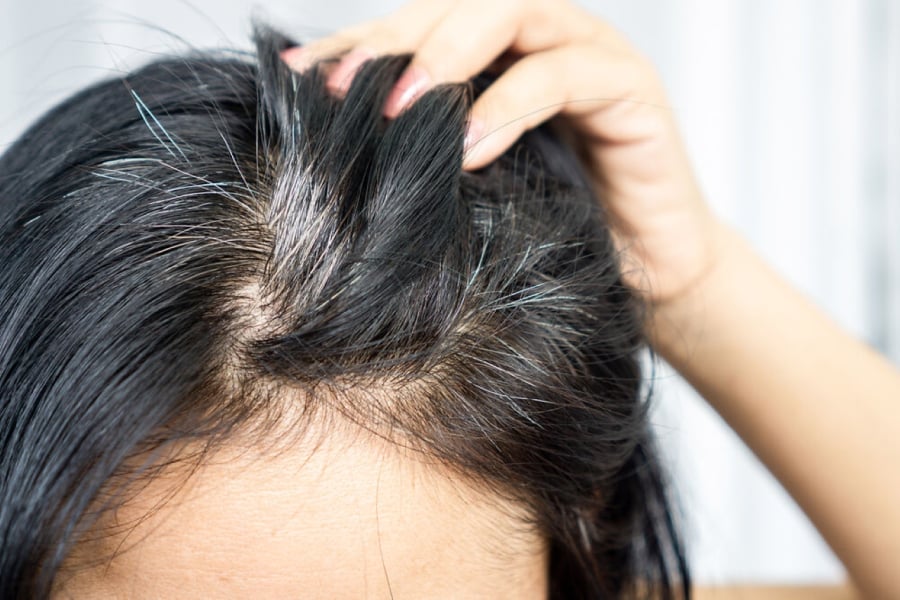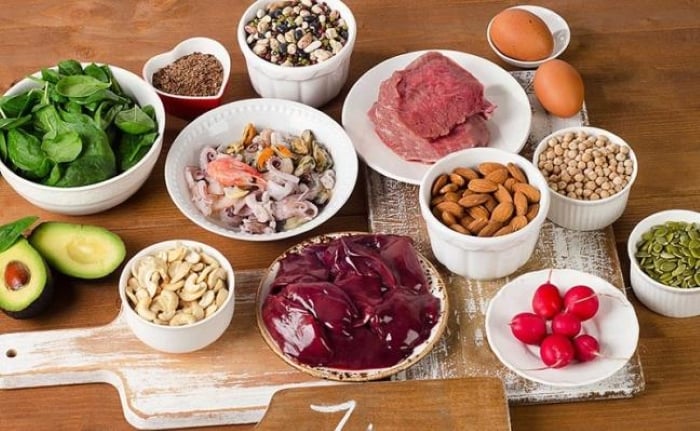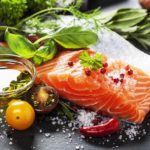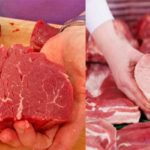Why Does Hair Turn Gray?
Our hair follicles produce less pigment, which is responsible for creating our hair color, and as we age, our hair turns gray. However, if this process starts early, it could be due to several health and lifestyle variables, including certain nutritional deficiencies.

Gray Hair is Caused by Reduced Melanin Production
Dr. Santhana, a renowned dermatologist at Shree Hospital in Mumbai, India, explains, “Gray hair is an inevitable part of the aging process and will happen to everyone at some point. However, due to modern stress factors and poor nutrition, we are seeing an increasing number of people experiencing premature graying.”
To combat this, there are certain foods and nutrients we can incorporate into our diets to help prevent premature graying.
5 Nutrients to Prevent Gray Hair and Thinning
1. Protein
Hair is almost entirely made up of protein, and the scalp, the living, breathing organ beneath our hair, requires protein to stay active and for proper hair metabolism. In particular, vegetarians must consume sufficient protein to meet their amino acid requirements.
We need 1g of protein per kg of body weight per day, either through our diet or supplements. Simply put, protein is the building block of hair, and a deficiency can lead to various issues, including gray hair.
Good protein sources include:
- For Vegetarians: Lentils, Peas, Buckwheat
- For Non-Vegetarians: Eggs, Fish
2. Omega-3 Fatty Acids
These are essential fatty acids necessary for the body, hair, and scalp health but are not produced by the body, which is why you need to obtain them from your diet. Omega-3 fatty acids ensure hair remains soft, shiny, and smooth, preventing hair loss and thinning while promoting hair growth. The body requires a minimum of 250mg, either through your diet or supplements.
Good sources of omega-3 include:
- Non-Vegetarian Options: Fatty fish like salmon or shellfish
- Vegetarian Options: Flax seeds, Chia seeds, Walnuts, Soybeans
3. Vitamin D
Apart from keeping your bones healthy and strong, one of vitamin D’s roles is to stimulate new and old hair follicles. When there isn’t enough vitamin D in the body, your hair may turn gray or white.
A study published in the International Journal of Trichology found that young people with premature graying had lower vitamin D levels. But remember, both vitamin D deficiency and excessive consumption can lead to hair loss. So, consume it in moderation.
Vitamin D, also known as the sunshine vitamin, must be supplemented. The recommended dosage is 1500 – 2000 International Units (IU) per day.
Food sources of vitamin D include:
- Non-Vegetarian: Eggs and Fish
- Vegetarian: No natural sources, but fortified milk and breakfast cereals are available.
4. Iron and Copper
Hair loss and graying are one of the symptoms of iron deficiency, as the body’s inability to adequately deliver blood to the hair follicles disrupts their functioning. To prevent thinning and gray hair, iron and copper are among the most necessary nutrients.

Include Iron and Copper-Rich Foods for Healthier Hair
In fact, an independent study suggested that sufficient iron and copper levels could help prevent premature graying. Aim for about 8-10mg of iron and 1000-1200mcg of copper daily.
Food sources include:
- Vegetarian: Eggs, Shellfish
- Non-Vegetarian: Dark, leafy greens, Dark Chocolate
5. Vitamin B Complex
Vitamins are essential nutrients to promote hair growth and prevent any hair problems.
One of the best vitamins for hair is the B-complex vitamin. B-complex vitamins like B12, Biotin, and B6 are crucial for hair strength and color.
Deficiencies in any of these nutrients are considered a driving force behind gray hair. Vitamin B supplements are beneficial in preventing gray hair. We need about 500-600mcg of B-complex vitamins daily.
- Non-Vegetarian: Eggs, Liver, Meat
- Vegetarian: Nuts, Leafy Vegetables, Nutritional Yeast
Incorporating these nutrients into your diet can give you long, black, and voluminous hair! So, let’s not forget to include the above-mentioned foods in our diet to ensure a steady supply of all the necessary nutrients for healthy hair.
Discover the Top 12 Omega-3 Rich Foods
 Omega-3 Rich Foods’>
Omega-3 Rich Foods’>Contrary to popular belief, not all fats can be harmful to our health. In fact, some types of fat can be beneficial, assisting in the process of maintaining a healthy lifestyle. We often hesitate to consume fat due to fear of gaining weight, but it can be beneficial to learn more about the different types available.


































